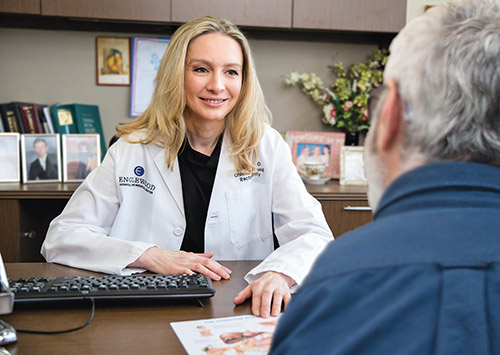
(Courtesy of Englewood Health) On February 20th of this year, British actress Dame Julie Walters sat down with the BBC’s Victoria Derbyshire to announce that in 2018, she was diagnosed with Stage 3 colorectal cancer.
The 69-year-old actress—of Mama Mia and Billy Elliot fame—initially visited her doctor complaining of indigestion and slight discomfort; when she returned a year later, her symptoms included stomach pain, heartburn, and vomiting.
Now, 18 months after her diagnosis and having completed treatment, Walters expressed extreme gratitude that her cancer was caught while it was still “fixable.” Unfortunately, for many patients with colorectal cancer, their diagnosis comes at even a later stage. When patients are diagnosed with Stage 4 colorectal cancer, cure is not possible and the treatments are less effective.
Anna Serur, MD, chief of colorectal surgery at Englewood Health, specializes in the detection and treatment of colon and rectal cancers.
Dr. Serur explained that rates of colorectal cancer in young Americans are on the rise, reflecting an increase in risk factors for the disease, such as obesity, sedentary lifestyles, and high sugar consumption.
“We are seeing an increase in younger patients with colorectal cancer—sometimes age 30 or younger. My advice to them is: Do not ignore your symptoms. If you start seeing blood in your stool or your bowel habits change, it doesn’t matter if you are 23 or 63, you should bring it to the attention of a medical professional,” says Dr. Serur.
One in three people who develop colorectal cancer have a family history of the disease. The risk increases if that family history presents in a first-degree relative, such as a parent, sibling, or child. If you are high risk, it is recommended that you begin cancer screening either at age 40 or 10 years prior to the age your relative was diagnosed, whichever is sooner.
“For those at average risk,” says Dr. Serur, “you should have a colonoscopy every 5–10 years, starting at age 50, and for African Americans, starting at age 45. Screenings can detect inflammation and abnormalities such as precancerous polyps (growths on the lining of the colon and rectum) that can often be removed during the colonoscopy, which is cancer prevention at its best.”
It’s an unfortunate truth that many colorectal cancers go undetected because people are afraid of the screening process. But, according to Dr. Serur, much of the fear surrounding colon cancer screening is based on misinformation.
“Think of a colonoscopy as a safe juice cleanse—all the rage lately! The procedure itself, which is done under sedation, is quick and painless. Also, I recommend talking to your doctor about what screening options are right for you. If you’re 50 or older with an average risk for colon cancer— and without symptoms—you may be able to do noninvasive screening from the comfort of your home, using stool sample kits that can detect abnormalities,” says Dr. Serur.
In addition to the more obvious ways we can prevent colorectal cancer—staying active, drinking lots of water, eating a balanced diet, and maintaining a healthy weight—Dr. Serur recommends that we also consider the connection between our gastrointestinal tracts and our emotions.
“Anger, anxiety, sadness, elation—all of these feelings, as well as others, can trigger symptoms in the gut. There is undoubtedly a gut/brain connection. So, if you’re looking to manage stress to improve your gut health, try acupuncture, yoga, massage, or meditation,” says Dr. Serur.
During her interview with the BBC, Walters spoke briefly about the stigma associated with illnesses and with diseases of the bowel, in particular. She urged listeners to pay attention to their symptoms and to “get things checked.” As for being embarrassed about discussing your symptoms with your doctor, she provided succinct advice: “Doctors are used to bottoms. They’ve got one themselves. Hopefully!”










